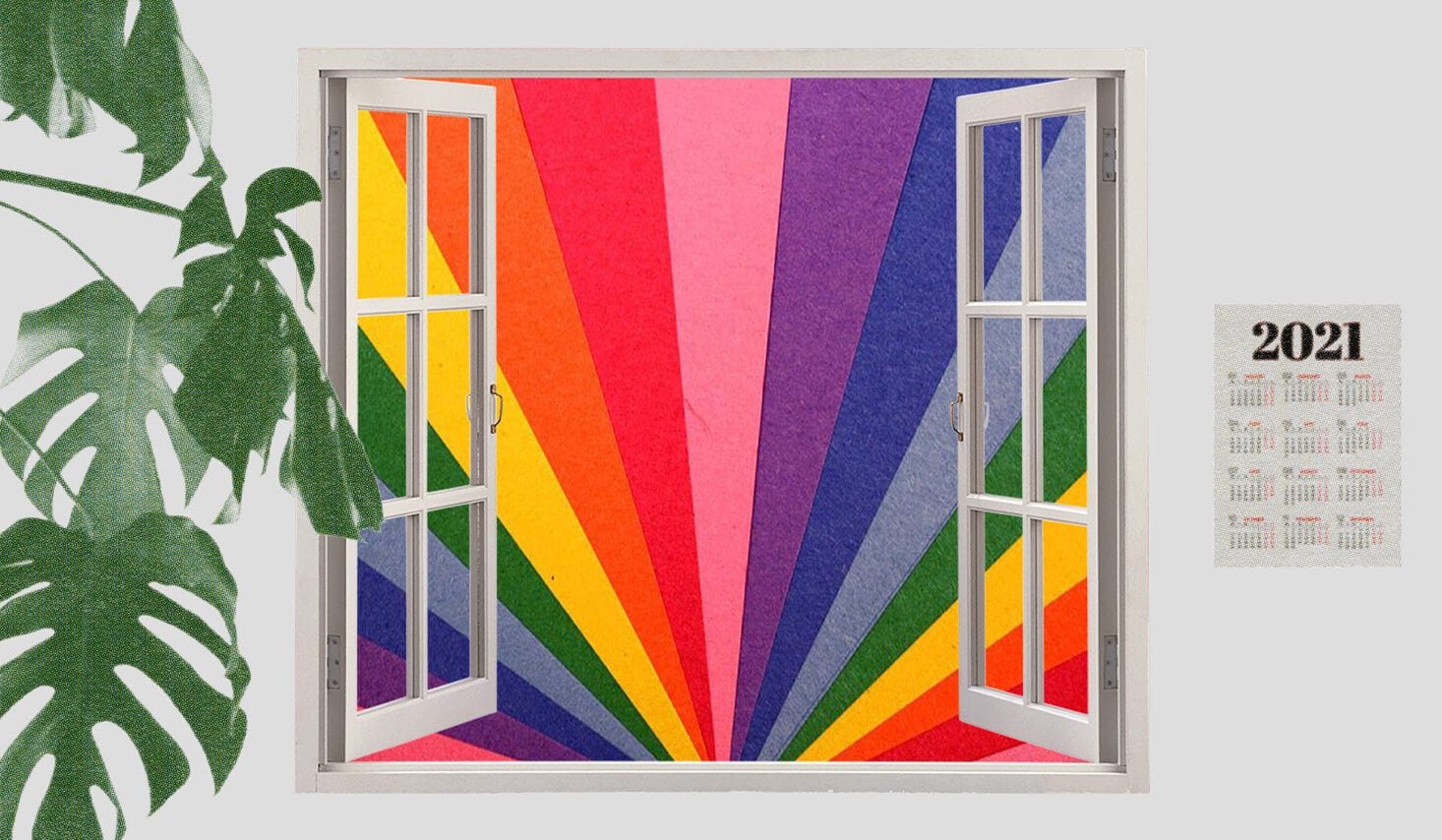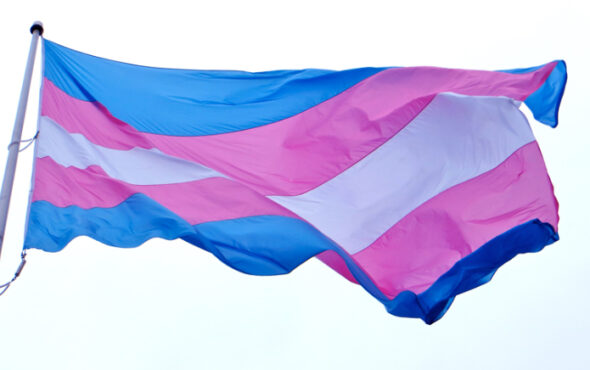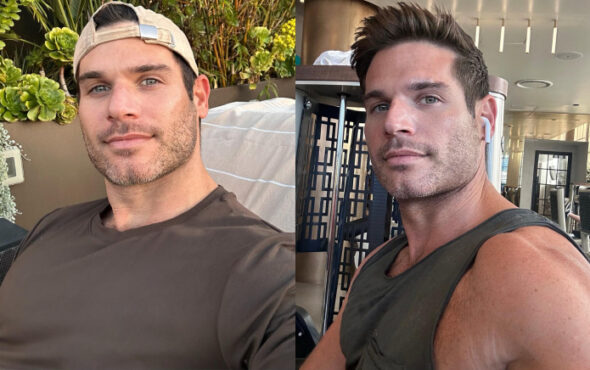
It’s been little over a year since lockdown began and the last 12 months have been unlike any other. Apart from our chosen families, friends, and community, many of us were left grappling with our newly adjusted ways of life. And, too often, we found ourselves stuck inside intently listening to the frighteningly high infection rates and closure of our adored venues.
Now, as we slowly fall back into normal routines and schedules, we hope to share a message of solitary, an acknowledgement of struggle, and how difficult the pandemic has been for LGBTQ+ individuals. Together, we will continue to celebrate diversity and unity to come out of lockdown as a stronger community.
Max Wilson, 30, who identifies as nonbinary, has had a year of financial losses, breakups and mental health struggles. Now, they are adjusting to lockdown and spending time by themselves. Finding themselves with more time on their hands, they have been able to repair their relationship with themselves. “I genuinely used to despise being alone, and now I need it a lot of the time. I need so much time to recharge myself, and the amount that I have grown to enjoy my own company,” they tell GAY TIMES.
As social restrictions start to loosen, Max is looking ahead to being able to get through the remainder of restrictive time indoors. “I’m sure I’ll find a magical energy source and continue through lockdown by becoming my authentic gorgeous self and cure all my mental illness concerns,” they say. More than anything, they’re longing for “sweaty dance floors, chippy after a club, meeting someone and falling for them and then meeting someone else and falling for them too”. But, most importantly, they hope the LGBTQ+ community can come together in a time of need and solidarity: “I hope we will come away from this stronger and strengthened [and] we can see that who we are can never be taken away.”
Kairo Urovi, 21, are trans masculine and have found lockdown particularly difficult as they had to move back home. “Although my family know that I am queer, at the time they did not know about my transness,” they say. “I felt incredibly suffocated because I could not live in my truest form.” By November last year, Kairo began socially transitioning and moved out from his family home. “To me, it felt like a matter of survival, it was almost as if I had no other choice because I could not keep living in a space that did not allow me to grow into the person I wanted to be,” they explained.
We ask Kairo if they were able to take away anything constructive from their time during lockdown. “Over the pandemic, I have learnt patience and forgiveness. I realised that I am going to live with myself for the rest of my life and at some point, I am going to have to forgive myself for a lot of things,” they reflect. “I have learnt to let go of the outcome and focus on the process, especially when it comes to my transition.
“This year has been a lot about surviving and, for the coming years, I wish my trans and queer siblings nothing but joy and fulfilment. Queer joy is powerful and will change the world.”
A student at university, Safi Bugel, 23, took the social restrictions surrounding lockdown as an opportunity to have a relaxed night in. “I’d normally see several people each day, from busy university and work environments to pints and dinners with friends through the evening,” she explains. “Weekends were mostly characterised by partying or just hanging out with groups of people. However, I’ve learnt that a sober night in on my own with a book or some TV can be, and is, enjoyable.”
As a self-described extrovert, she describes how she misses the freedom of going out, to clubs, drinking, socialising and appreciates how these spaces are vital for the LGBTQ+ community. “These are spaces where we can meet people, let loose, dress up, feel safe, have fun. It’s such an important release,” she says. “All my best friendships and relationships were formed in club settings and music/partying is such a big part of my life. Chatting and dancing are my favourite pastimes!”
Claire Browne, 26, found the lockdowns “relentless”. She explains the impact they had on her mental health: “I’ve hit a huge brick wall in terms of my ability to communicate – with my friends, my girlfriend, my work. Suffocating and hopelessness are the only things that come to mind at the minute.” However, all was not lost while stuck inside as she was able to become better with isolation and even picked up gardening as a hobby. “I did learn the value of being alone. I came into the first lockdown still very much in the emotional wake of a big breakup, and as a serial monogamist, it was the first time I was forced to sit and deal with everything without the distractions of dating, friends, other people,” she says.
An editor and an activist, Claire found herself working from home which made her re-evaluate her lifestyle balance. “The pandemic highlighted how out of whack our work/life balance is as a society,” she tells GAY TIMES. “This weird, ‘gotta grind and do overtime’ culture is just so bizarre, and working from home highlights just how much of our day and the literal life we sacrifice to making a living.”
Another aspect of lifestyle Claire has been thinking about is the queer club London scene. As a self-professed lover of dancing in overpriced joints, she also values them as safe spaces and networks for the LGBTQ+ community. “As a lesbian, it’s hard to have organic encounters with other queer womxn. Finding other LGBTQ+ people I could relate to has been something I miss so, so much. Lockdown had me feeling like I was losing touch with my queerness, I felt (and feel) stifled and more inundated with heteronormative narratives and structures than ever before.”
Due to the pandemic Glynn Bailey, 23, found himself going from being financially independent and stable in Sheffield to moving back home, unemployed and isolated. For him, lockdown forced a lot of self-reflection. “The pandemic has taught me, if anything, about myself. I’ve kept myself busy since I came out at 17, and only when I was forced to slow down, to actually sit alone with myself with no distractions, did I realise that I still had so much to process,” he says. “I’d built up this queer identity I felt proud telling people about, but then subconsciously, I was telling myself it was still taboo in public. So, despite all of the negative, I appreciate the pandemic for forcing me to learn and dismantle that behaviour.”
As we edge closer to Pride Month, Glynn reminisces when he last attended Pride while closeted. Now, if given the opportunity, the writer admits he would love to go again. “There is nothing more I’d enjoy than being in a place filled with open, accepting, queer people. I want a venue filled with everyone from every walk of life. Whilst a big celebration is wonderful, it’s imperative that we build something that is truly inclusive. Shouldn’t the takeaway from this pandemic be community? Isn’t that really what we’re all missing in one way or another?”
For Saori Borrayo, lockdown taught her the importance of community care and tells GAY TIMES what this meant to her: “I attended more BIPOC-centered webinars and joined coalitions of community members in my area.
“I finally understood what it really means to be there for other folks and what my role is in supporting the movement for liberation from and the abolition of systems of oppression – providing meals for unhoused persons, donating to important causes, and committing to transformative justice in all aspects of my life,” she explains. “I’ve felt more comfortable in spaces where I know there is a sense of community, even if it’s just a part of our identity that brings us together. For me, music shows and clubs have always been places of liberation and performance; places where we can be ourselves and let loose.”
As we pass the milestone for a year in lockdown, we ask Saori what she misses most. “A lot of my friends facilitate community-based-knowledge workshops and artists’ events; I miss those spaces the most,” she says. “There was always a sense of intimacy that can’t be replicated in Zoom meetings and other video calls. I miss the euphoria that came with looking around a room of smiling faces and simply being in each other’s presence.”
Over lockdown, Nivetha Tilakkumar has found the absence of queer spaces for PoC the most notable. In acknowledging her own privilege, she’s aware that she is “lucky” to live in a house of “queer people or women”. While stuck indoors, Nivetha took the time to pick up new skills. “I learned how to do embroidery! I do yoga every day and finally, I’m able to do a headstand after years of practice so that’s an achievement! I’ve also taken after my mum and been tending to my plants and seedlings,” she tells GAY TIMES.
Outside of self-taught skills, Nivetha believes the senses of community amongst LGBTQ+ people has strengthened. “I think our community has really learnt the meaning of being together. There are issues of diversity within queer spaces and I really hope that the pandemic (and 2020 in general) has taught people the value of coming together as a community,” she explains. “So many of us have been on our own, there are people who are stuck in houses with their families who they aren’t out to or aren’t accepting of them, there are people who haven’t had access to doctors they need, there are people who have been apart from chosen families, and so once this is all over, I really hope that we can truly be one as a community and just be more inclusive.”
For Zaide O’Rourke, 25, a year in lockdown has been concentrated on self-education and activism, and he has a message of solidarity to share. “The pandemic has pushed us (myself included) to spend more time online; the power of social media as a resource has been eye-opening,” he says. “During the re-surge of the BLM movement last summer, the rise in anti-Asian hate crime and the creeping anti-trans legislation across the globe, it has been clear that social media can be a vital information tool for those belonging to marginalised groups such as myself, a queer brown man. Mainstream media often fails to cover these topics sensitively and free from bias, so I have learned to look elsewhere for certain aspects of my news.”
This essence of unity and camaraderie, for Zaide, flows back into LGBTQ+ spaces. “Gay bars offer a refuge from hetero-normativity and allow us to be our authentic self, celebrated wholeheartedly by our peers,” he explains. “These venues are vital for the mental wellbeing of queer folk, it is often our only fully safe space to let loose and even find love. I miss gay bars a lot, and while we have had our dose of drag through the TV, it is important for me to support and see local queens that rely on the scene for their art, expression and to pay their bills.”
Now, as things started to open up once again, Zaide hopes our community can take a lesson from the past year. He aptly summarises his message to others: “Be kinder, champion diversity and commit to inclusivity.”


